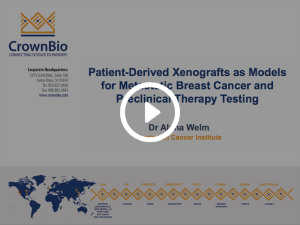Close
Contact UsLanguageSearch
- Our Services
- Platforms
- In Vivo
- PDX Models
- CDX Models
- Syngeneic Models
- Humanized Models
- Humanized PBMC Models
- Humanized Genetically Modified Mouse Models
- Tumor Homograft Models
- Orthotopics with Advanced Imaging
- In Vitro
- 2D Cell Lines and Panels
- Syngeneic Cell Lines
- CRISPR/Cas9
- Organoids
- High Content Imaging
- Tumor Tissue Microarray
- Biospecimen Solutions (Human) BackExit
- Biomarkers and Bioanalysis
- Data Science and Bioinformatics
- In Vivo
- Target Solutions BackExit
- Technologies
- Bioinformatics
- Preclinical Biomarker Discovery
- Genomics Data Analysis
- Proteomics Data Analysis
- Mouse I/O RNA-Seq Panel
- Cell Line Authentication with Deep Sequencing
- CrownSyn™
- Genomics
- Standard Genomics Services
- Next Generation Sequencing Services
- Cell Line Authentication (CLA) with Deep Sequencing
- Mouse I/O RNA-Seq Panel
- NGS Data Analysis
- Biomarker Analysis
- Biofluid Testing
- Cytokine & Chemokine Profiling
- Flow Cytometry
- Rare Cell Analysis
- Mass Spectrometry-based Proteomics
- In Vitro High Content Imaging BackExit
- Mass Spectrometry-based Proteomics
- Ex Vivo Patient Tissue
- Spatial Multi-Omics Analysis
- CRISPR/Cas9
- Bioinformatics
- Service Types
- Laboratory Services
- Genomics and Transcriptomics
- Proteomics Services
- Spatial Biology and Digital Pathology
- Immune Monitoring
- Bioanalytical Services
- Biomarker Discovery
- PDX Mouse Clinical Trial
- Biomarkers of Response
- Biomarker Discovery and Companion Diagnostics
- Signatures of Response: Predictive Biomarkers
- Pharmacology & Bioanalytical Services
- Biofluid Testing
- Rodent Immuno-Safety Models
- Safety Pharmacology Studies
- Structural Biology
- Target Validation
- Screens BackExit
- Toxicology
- DMPK Services
- Consulting
- Efficacy Testing
- Laboratory Services
- Platforms
- Our Science BackExit
- About Us
- Our Company
- Our Purpose
- Our Responsibility
- Leadership Team
- Scientific Advisory Board
- News & Events
- Awards & Testimonials
- Career Opportunities
- Contact us

 Presenter: Dr. Alana Welm, PhD, Huntsman Cancer Institute
Presenter: Dr. Alana Welm, PhD, Huntsman Cancer Institute Dr. Welm completed her PhD in Cell and Molecular Biology at Baylor College of Medicine in Houston, TX under the supervision of Gretchen Darlington, PhD. She then went on to conduct postdoctoral training in nobel laureate Dr. J. Michael Bishop’s laboratory at the University of California, San Francisco where her work focused on developing new models of breast cancer metastasis. Dr. Welm started her laboratory at the University of Utah’s Huntsman Cancer Institute in 2007, and was promoted to Associate Professor with tenure in 2013.
Dr. Welm completed her PhD in Cell and Molecular Biology at Baylor College of Medicine in Houston, TX under the supervision of Gretchen Darlington, PhD. She then went on to conduct postdoctoral training in nobel laureate Dr. J. Michael Bishop’s laboratory at the University of California, San Francisco where her work focused on developing new models of breast cancer metastasis. Dr. Welm started her laboratory at the University of Utah’s Huntsman Cancer Institute in 2007, and was promoted to Associate Professor with tenure in 2013.
